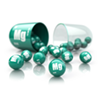
The irreplaceable role of magnesium
Magnesium is most often found in the form of the magnesium cation Mg2+ and is a component and activator of more than 600 enzymatic systems.
It is important primarily for the function of the nervous system and muscle function (including the heart).
The main sources of magnesium include dark leafy vegetables, legumes, nuts, whole grains, fruits (the most important are bananas and avocados), dark chocolate, yeast, mineral waters with a higher magnesium content, etc.
Absorption is positively influenced by sufficient amounts of selenium and vitamin D. Conversely, excessive intake of fats, sugars and alcohol has a negative impact on absorption. The availability of magnesium in the body also depends on the intake of calcium (it is necessary to take it in the correct ratio and at the recommended intervals).
Symptoms of magnesium deficiency:
Supplementation options:
In addition to a varied diet, you can use food supplements or registered medicines (without a prescription). Magnesium is available on the market separately or in combination with vitamin B6. When choosing a preparation, it is advisable to pay attention to the amount in one tablet and the salt in which it is bound. The best absorbable forms are organic salts.
The recommended daily intake is 300 mg for women and 350 mg for men.
Magnesium can be administered in accordance with the recommended dosage for a long time. Freely according to the web portal of the Czech Chamber of Pharmacists for the public Lékárnické kapky, 30.6.2025

31. 1. 2026
eVouchers in practice eVouchers are electronic vouchers for medical devices and, with their functionality, they will mandatorily replace paper vouchers from January 1, 2026.

31. 12. 2025
Antibiotic resistance continues to rise. The eleventh annual World Antibiotic Week, organized by the World Health Organization, took place during November.